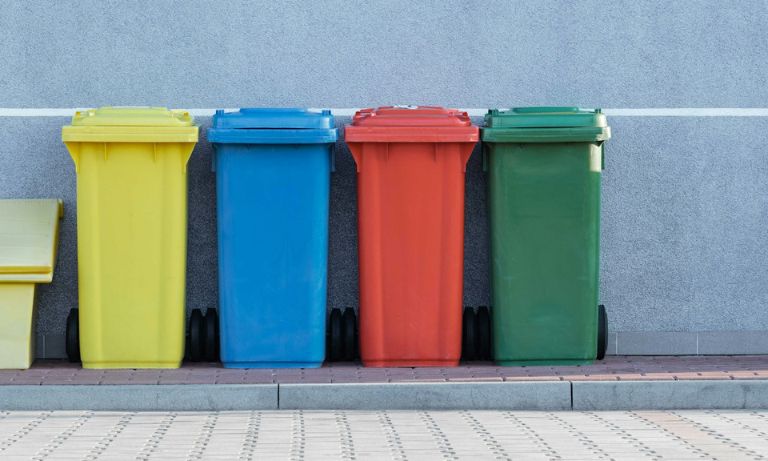Effective waste management is essential for keeping workplaces, schools, and communities clean, safe, and environmentally responsible. From sorting recyclables to disposing of general waste, the right recycling bins and disposal systems are critical to maintaining efficiency and supporting sustainability goals.
What are the Different Types of Bins You Need?
Each type of bin serves a specific purpose in the waste management process. Choosing and using the right one helps reduce contamination and improve recycling efficiency.
Garbage Bins
Garbage bins are used for non-recyclable waste such as food scraps, contaminated packaging, and certain plastics. In most workplaces and schools, these bins are easily identified by a red or grey lid and are designed to keep non-recyclables separate from recyclables and organics.
Recycling Bins
Recycling bins are essential for collecting items that can be reprocessed into new products, including paper, cardboard, glass, and metals. Many workplaces use colour-coded bins and clear bin signage to help users identify where each waste type belongs, reducing errors and improving waste diversion.
Waste Bins and Industrial Waste Bins
The term “waste bin” covers all waste collection units, including general waste, recyclables, and organic bins. For high-volume operations, industrial waste bins are built with reinforced materials and large capacities, making them ideal for warehouses, construction sites, and manufacturing facilities.
Why Waste Sorting Matters
Sorting waste correctly is one of the most effective ways to increase recycling rates and reduce landfill waste. It also helps organisations contribute to greater waste diversion and sustainability, ensuring valuable materials are recovered rather than discarded.
Colour-coded systems make sorting simple:
- Red for landfill waste
- Yellow for recyclables
- Blue for paper and cardboard
- Green for organics
Encouraging correct sorting also reduces contamination, helping to create more efficient recycling streams and lowering disposal costs.
Waste Management Solutions to Consider
Modern waste management involves more than just emptying bins. Innovative brands are helping workplaces and schools improve recycling outcomes through design, durability, and smart functionality. If you’re hoping to improve your workplace’s waste management practices, here are some of the best recycling bins to get.
Method: Smart, Modern Recycling Stations
Method Recycling transforms recycling into a clean, intuitive workplace process. Their modular bin systems are easy to use and visually clear, encouraging participation in waste sorting. Each colour-coded bin supports correct material separation, making recycling natural and consistent across offices, schools, and workplaces.
Method’s solutions align with effective waste diversion strategies, helping businesses improve recycling rates, minimise contamination, and build sustainability performance as part of daily operations. For practical guidance, exploring how to boost business recycling and become more sustainable can further advance workplace recycling success.
SULO: Durable and Reliable Waste Solutions
SULO is known for manufacturing high-quality Australian-made bins using recycled materials. Their focus on circular design allows old bins and packaging waste to be remade into new products. SULO bins meet strict Australian standards and are purpose-built for reliability in demanding environments.
By working with local councils and business facilities across the country, SULO helps reduce landfill through durable, reusable waste infrastructure, supporting long-term waste reduction goals at every level of operation.
TerraCycle: Recycling Hard-to-Recycle Items
TerraCycle offers a unique approach to recycling items that traditional systems overlook. Their programs accept complex waste streams such as coffee capsules, cosmetics, and office stationery. Through their Zero Waste Boxes, businesses can collect and recycle almost any product category, preventing thousands of tonnes of waste from reaching landfill.
Terracycle’s model bridges gaps in conventional waste systems, enabling organisations to meet waste reduction goals while contributing to a more circular economy. This reinforces long-term sustainability across industries that generate mixed material waste.
Choosing the Right Recycling Bins for Your Organisation
Providing the right recycling bins is only part of the solution. Long-term waste reduction requires a commitment to education and behavioural change. Staff and students who understand how and why to sort waste properly are more likely to maintain good habits over time.
Regularly reviewing bin placement, monitoring contamination rates, and updating signage can all help improve outcomes. Encouraging participation through green team initiatives or sustainability challenges can also make a lasting difference.
When combined with effective infrastructure, these efforts promote a workplace culture that values waste diversion and sustainability at every level.

